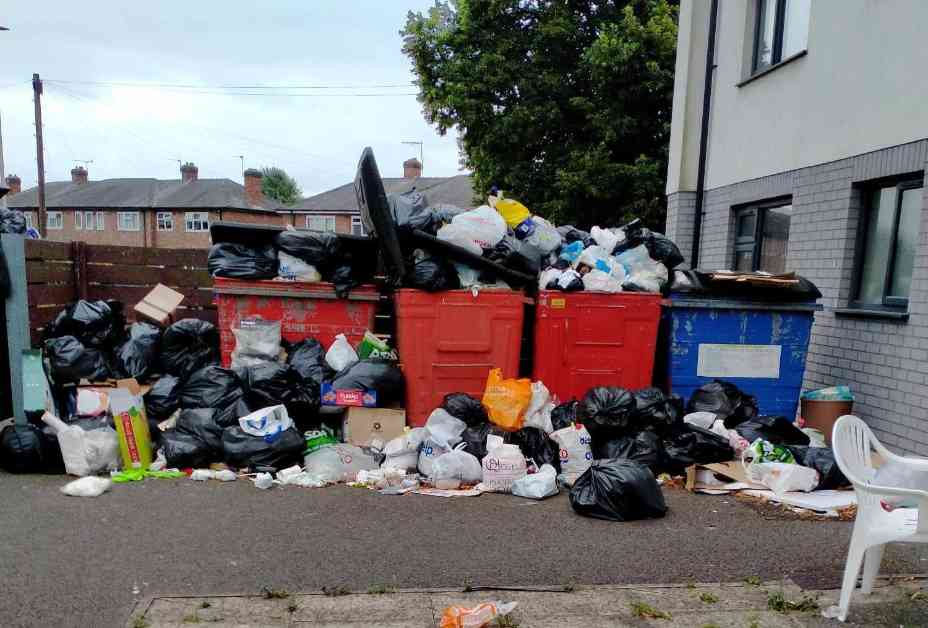At Torus-Owned Apartment Blocks, Managing Waste to Address Fly-Tipping Issues
In a recent development in Warrington, a row of apartments owned by Torus faced a significant waste management issue that led to four weeks of no bin collections, causing distress to residents and creating a breeding ground for flies. The root cause of this problem seems to be attributed to fly-tippers who are not residents of the apartments but are regularly dumping their rubbish in the communal bins. This has sparked concerns among residents and authorities alike, highlighting the importance of effective waste management strategies to combat fly-tipping issues in apartment blocks.
Residents of the apartment blocks on Alder Lane in Warrington expressed their frustrations over the lack of bin collections, which resulted in overflowing bins and a buildup of waste around the communal areas. Pictures circulating online depicted the shocking sight of rubbish bags piling up, creating an unsightly and unhygienic environment for residents. The situation was exacerbated by an infestation of flies, making it challenging for residents to open their windows due to the foul smell and pest infestation.
Addressing the complaints raised by Orford residents, Warrington Borough Council acknowledged the issue and stated that their waste management team had visited the properties on Alder Lane twice. However, due to overflowing bins and additional side waste, it was not possible to collect the waste at that time. The council reached out to the housing provider, Torus, who agreed to clear the waste overflow to facilitate future collections and maintain a clean living environment for residents.
A resident, Carol Kilgannon, voiced her dismay over the situation on social media, highlighting the impact of the uncollected waste on residents’ daily lives. She emphasized the need for immediate action to address the ongoing waste management challenges faced by the apartment blocks. Kilgannon’s concerns echoed those of many residents who felt frustrated by the lack of resolution to the waste management issues plaguing their community.
In response to the ongoing problem, Warrington Borough Council issued a reminder to residents to ensure that bin lids are closed and that waste teams are unable to collect any side waste. This directive aims to streamline the waste collection process and prevent further accumulation of waste in communal areas. By adhering to these guidelines, residents can contribute to maintaining a clean and sanitary environment within their apartment blocks.
Reflecting on the persistent issue of fly-tipping in the area, Carol Kilgannon highlighted the role of non-residents who are dumping their rubbish in the communal bins, contributing to the overflowing waste problem. She urged Torus, as the housing provider, to take proactive measures to address the issue and prevent future occurrences of fly-tipping. Kilgannon’s call for action resonated with residents who shared similar concerns about the environmental impact of unchecked waste disposal practices in their community.
Torus, as the owner of the housing complex, issued an apology for the recent waste management challenges faced by residents. Jan Calland, housing services director for Torus, expressed regret over the delay in clearing the fly-tipping from the location and assured residents of their commitment to addressing the issue. By working closely with partners, including Warrington Borough Council, Torus aims to take decisive action against those responsible for environmental crimes such as fly-tipping.
In light of the ongoing waste management issues at the apartment blocks, residents are encouraged to report any concerns to Torus’ Neighbourhood team and utilize appropriate methods for disposing of bulky waste. By engaging with residents and fostering a sense of community responsibility, Torus aims to create a sustainable waste management system that prioritizes cleanliness and environmental protection. Residents can play a crucial role in maintaining the cleanliness of their living environment by following proper waste disposal practices and reporting any instances of fly-tipping or waste mismanagement.
Collaborative Efforts to Combat Fly-Tipping
The prevalence of fly-tipping in residential areas poses a significant challenge for local authorities and housing providers tasked with managing waste effectively. By fostering collaboration between residents, authorities, and housing providers, it is possible to develop sustainable solutions to combat fly-tipping and promote responsible waste disposal practices. Initiatives such as community clean-up events, educational campaigns on waste management, and increased surveillance in hotspot areas can help deter fly-tippers and create a cleaner living environment for residents.
Implementing Effective Waste Management Strategies
To address the root causes of waste management issues in apartment blocks, it is essential to implement effective waste management strategies that prioritize cleanliness, sustainability, and community engagement. By establishing clear guidelines for waste disposal, enforcing penalties for illegal dumping, and conducting regular waste audits, housing providers can ensure that residents have access to proper waste collection services and maintain a clean living environment. Additionally, investing in infrastructure improvements such as secure bin enclosures, waste segregation systems, and recycling facilities can help mitigate waste accumulation and promote eco-friendly practices among residents.
Empowering Residents Through Education and Engagement
Empowering residents to take ownership of their waste management practices through education and engagement initiatives can foster a sense of community responsibility and accountability. By providing residents with information on proper waste disposal methods, recycling options, and the environmental impact of fly-tipping, housing providers can encourage residents to make informed choices and contribute to a cleaner, more sustainable living environment. Engaging residents in waste management decisions, soliciting feedback on service improvements, and fostering a culture of environmental stewardship can lead to long-term behavior change and positive outcomes for the community as a whole.
In conclusion, the challenges of managing waste at Torus-owned apartment blocks in Warrington highlight the importance of addressing fly-tipping issues through collaborative efforts, effective waste management strategies, and resident empowerment. By working together to combat fly-tipping, promote responsible waste disposal practices, and engage residents in sustainable initiatives, housing providers can create a cleaner, healthier living environment for all residents. Through proactive measures, community involvement, and ongoing commitment to environmental stewardship, Torus and local authorities can overcome waste management challenges and create a more sustainable future for apartment block residents.

